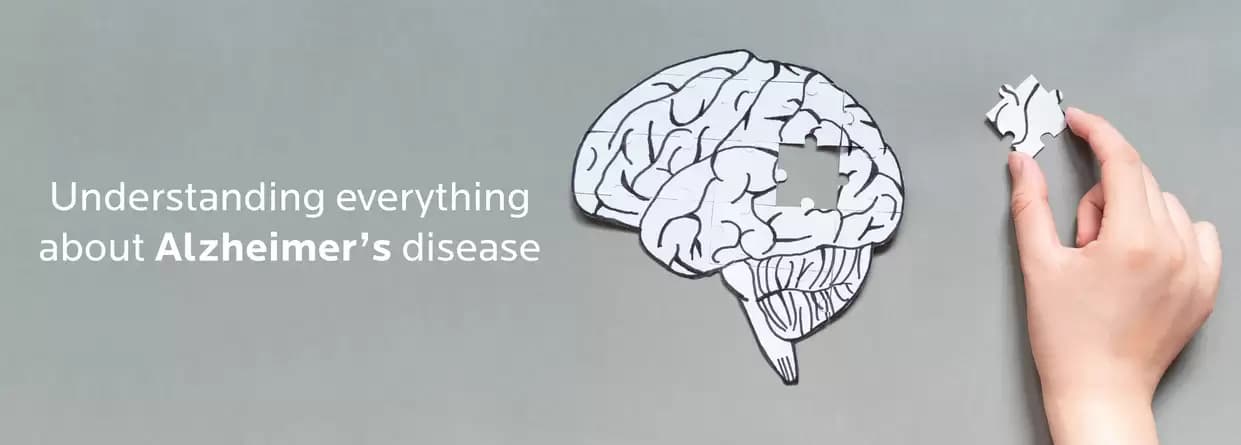
Alzheimer's is a progressive cerebral condition in which the brain degenerates slowly. This condition usually occurs in people 65-70 years of age and people who develop it experience changes in memory, thinking, social function and behaviour that deteriorate over time.
Alzheimer's is a progressive cerebral condition in which the brain degenerates slowly. This condition usually occurs in people 65-70 years of age and people who develop it experience changes in memory, thinking, social function and behaviour that deteriorate over time. These variations impact the everyday life of the patient, reducing their independence until, finally, the patient depends on others.
In this write-up, you will find a comprehensive discussion on Alzheimer’s disease so stick to the end.
Alzheimer's is an irreversible brain condition that progresses over time gradually abolishing human functions like thinking, memory, and the capability of doing the simplest everyday tasks. This condition is also defined as the most common cause of dementia. Since dementia is the loss of cognitive skills or functions like reasoning, thinking and the ability to remember it also changes the life and regular activities of a person. Alzheimer's is characterised by the build-up at the cerebral level of an amyloid protein causing a variation in the neurons.
Memory loss is one of the noticeable symptoms of Alzheimer's disease. The incapability to recollect any current events or discussion is the evident indicator of this condition. Additional symptoms also begin to evolve as the condition progresses.
Individuals suffering from the condition may observe that they are experiencing issues when recalling something and organising their thoughts. Here is a profound elaboration on Alzheimer’s symptoms:
Repetitive activities that require sequential actions, such as preparing and making a meal or playing a favourite game, become problematic as the condition grows. People with advanced Alzheimer's disease often lose their skills to do simple activities like dressing and bathing.
A person with Alzheimer's disease can experience brain changes which affect their mood and behaviour. Following are the instances of probable issues:
Every individual experiences periodic memory lapses once in a lifetime, but the memory loss related to Alzheimer's disease continues and increases, impairing one's capability to perform any action. Alzheimer's patients may:
Alzheimer's is caused by the shrinkage of parts of the brain, which affects the structure and function of certain brain areas. It is not identified yet exactly what causes this process. However, in the brains of people with Alzheimer's disease, studies have found several abnormal processes:
Diabetes, high blood pressure, and undoubtedly stress are health problems that also may have a negative influence on the onset of the disease
The diagnosis of Alzheimer's is prepared from a consultation with the neurologists. Sometimes there might be a need to perform blood tests and imaging tests. Several scales of assessment can be used to identify the symptoms and severity of the disease.
The doctor might initiate a mental status test for assessing short-term memory, long-term memory, and orientation to place and time.
The doctor might also conduct a physical exam which includes:
A neurological exam will also be assessed to check reflexes, muscle tone, and speech. The doctor might order brain imaging tests to create the brain pictures such as magnetic resource imaging or MRI and Computed tomography or CT scan.
To date, Alzheimer's disease has no cure. The available treatments for the disease do not stop the symptomatic progress but can postpone its worsening temporarily, thus improving the quality of life of the patients. At present, efforts are being made to find better treatments for this condition, to delay its onset and stop its growth.
For example, cellular therapies are well-known for their exceptional benefit of improving the damage of degenerative diseases such as Alzheimer's or multiple sclerosis. Since stem cells are not specialised cells, they can transform into any type of cell in the human body regenerating the damaged tissue. Thus, numerous experts and patients are using this kind of treatment to stop or reduce the course of many diseases.
There are common drugs recommended for Alzheimer's patients to control the symptoms:
Doctors also recommend medications to control the symptoms related to emotional and behavioural changes. It includes antidepressants, antianxiety drugs, and antipsychotic drugs for aggression, delusions, and hallucinations.
There are no measures for Alzheimer's prevention, but there are lifestyle habits that can prevent cognitive decline. Make sure to involve these lifestyle changes in your daily life:
Alzheimer’s is not only a complicated condition but also a nerve-wracking disease for someone who is suffering from it. The only way to prevent this disease is by living a healthy lifestyle. If you have a history of Alzheimer's, then you must consult with the best neurologists in Jaipur at CK Birla Hospital. By the time the doctor diagnoses this condition, it will be difficult to stop the progression. However, with treatment, you can control the symptoms and improve your quality of life.
What do Alzheimer’s patients forget initially?
People who have this condition often start to forget the passage of time, seasons, and dates. They even tend to forget the names of their family members, relatives, and close friends.
Which is the most common type of memory affected by Alzheimer’s?
Episodic memory is the most common type affected by this condition. Early signs include misplacing the keys, late bills and the missed appointments.
Written and Verified by:

Dr. Pushkar Gupta is Director of Neurology Dept. at CK Birla Hospital, Jaipur, with nearly 30 years of experience. He handles complex cases of stroke, epilepsy, headaches, CNS infections, tropical neurological diseases and neuromuscular disorders.
Similar Neurosciences Blogs
Book Your Appointment TODAY
© 2024 RBH Jaipur. All Rights Reserved.